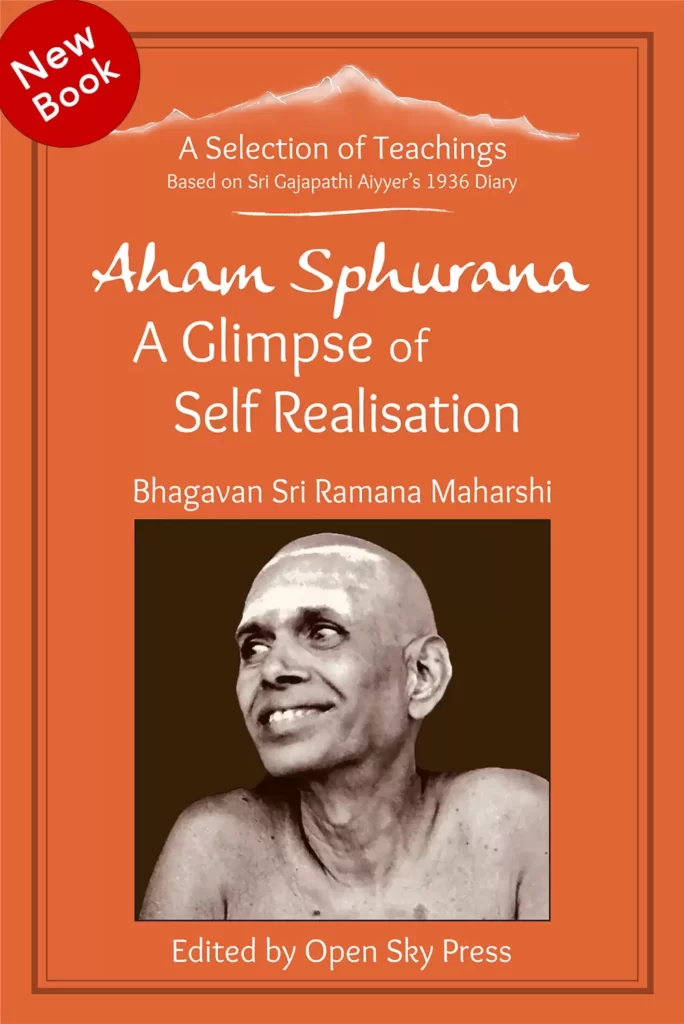
Aham Sphurana
A Glimpse of Self Realisation
New Book about Sri Ramana Maharshi

Available Worldwide
On www.openskypress.com and Amazon:

“In my opinion, Aham Sphurana, a Glimpse of Self Realisation, will become a Treasure Trove of Wisdom to the Seekers of Truth in general, and particularly to the devotees of Bhagavan.”
Swami Hamsananda – Athithi Ashram, Tiruvannamalai
A Dialogue with a Mature Visiter
Mons. Greenleaves, a Caucasian who seems to be a serious-minded Blavatskian, has arrived at the Ashram late-evening today. A few hours after nightfall he was to be found conversing with Chadwick and Cohen at the gentle giant’s little cottage. He is the headmaster of a school at Madanapalli, near Chitthoure. He professes to being a great admirer of Mrs. Annie Besant and Sri Gandhiji. His feelings towards J. K. are mixed.
He is yet to fully recover from the shock of the Order’s dissolution. From a young age he has been performing a comparative study of all the various religions and faiths around the world – in particular, he is interested in the Gnosticismodic dimensions he gleans in the Christ’s teachings.
He once had an experience of blissful mindlessness whilst sojourning alone in a tent in a forest. The experience came to him of its own accord. He has given himself to understand that the ecstasy he experienced on that occasion was supramental in nature. He is of the opinion that there is a self beyond and behind the mind – he suspects that this is the Athman that Vedanta speaks about.
Ever since that experience so unexpectedly happened to dawn on him, he has been burning with the curiosity to somehow discover this Athman. First thing tomorrow morning he is going to ask the Maharshi questions – appurtenant to this unusual experience that had chanced to come upon him.
He has read Sri Narasimha Swami’s biography of Bhagawan and Mr. Brunton’s Secret India; he loved the former work but believes that the latter was written by the author with the ulterior motive of promoting himself flamboyantly as a mystical-master so as to gain fortune and fame – whilst the book conveys the impression that Mr. Brunton, through the master’s grace, had reached the final state of Enlightenment as discernible on the basis of the context of the Maharshi’s teachings, Mr. Greenleaves doubts whether this happens to be genuinely the case.
Somebody claiming that he had gotten enlightened through Sri Ramana Maharshi was hugely respected in the Western world – sadly, this was the reason why many were now falsely claiming so. Mr. Greenleaves holds a postgraduation degree from Oxford University; he specialises in the Coptic language. He has no taste for the United States credo of Mass-market consumerism or Free-market Capitalism. The violent, unethical tactics of the Bolsheviks he found morally loathsome and disturbing; he is convinced that it was the Prussian Kaiser who had meticulously helped Lenin carry out the Revolution, so that the War could end on terms favourable to Germany, although that objective was not realised ultimately.
He did not particularly approve of the Fascismo regimes going on in Germany and Italy; but so long as they did not threaten the peace, he does not see what there was to feel agitated about. Communism, he feels, was shockingly abhorrent since it deprived man of the joy of exploring and utilising the talents innate to his individual personality, and thus by implication the opportunities those talents would entail for exploitation material, intellectual, and even philanthropical. Communism is an outright evil, he asseverates emphatically.
Of himself he does not have much to add. His father had been a medical doctor employed in the Transvaal, and had been fortunate enough to serve as personal physician to the great President Paul Kruger himself, if only briefly. He was pleased with the hospitality extended unto him by the sarvadhikari. Then Chadwick showed him his translations of some of the master’s poems in praise of Lord Arunâchaleshwarâ. The fascinated Caucasian sat late into the night perusing Bhagavan’s translated lyrics.
24th September, 1936
Mons. Greenleaves introduced himself to the master, and Bhagavan smiled kindly at him. He handed over a note to the interpreter. As was sometimes done, especially in cases of practice-related doubt raised by Caucasians through a notepaper scribble, for the benefit of all attendees the contents were read out to the Hall, so that the master’s [presently anticipated] reply [to the extent any came] could be comprehended in the light of enhanced contextual clarity by all present—
“One experiences sometimes a flash of cosmic consciousness whose locus seems to be without the normal self. Given that the seeker is not interested in burdening himself with philosophical concepts, and therefore seeks an explanation that would be of pragmatic utility, how would Bhagavan advise him to work towards (a) obtaining, (b) retaining, and (c) extending such flashes? In order so as to be eligible to invoke such flashes at will, should one retire from worldly life?”
B.: You say that what you experienced was felt to be outside you. But think – can there be any experience in the absence of the experiencer? All his experiences are vested in the experiencer only. There thus cannot be anything which, being outside you, is yet within the horizon of your perceptivity or experience.
Outside or inside whom? Whose outside and whose inside? The one who forms the subject-matter of the bifurcation “inside” and “outside” – who is he? Investigate. You will find that the ideas of inside and outside are relevant only if and exclusively insofar as there is a subject and object. Since the perceiver of objects and experiencer of experiences is vested only in the subject, upon introspection it is discovered that all objects and experiences resolve themselves into the subject only.
But who is this subject? Investigate. “Who am I?” or tracing the ahamvritti to its source is the practice. Investigating yourself, the subject, you are drawn into the realm of pure Subjective Consciousness, which is beyond the subject. You talk of a normal self. What, according to you, is this normal self?
Mr. Greenleaves: The mind.
B.: Yes. Mind is only a notion. Have you ever investigated into what it actually is?
GL.: No… I seem to have taken its existence for granted so long.
B.: That is the mistake. The mind is accepted as being the Self. The Self is always – whereas the mind appears and disappears. Is there any mind in deep slumber? But your Self is always there. The mind, which has deluded itself into imagining that it is a mortal with a physical form living in an objectively real world as its perceiver, is beset with limitations.
On the other hand, pure Subjective Consciousness knows no limitation.
GL.: How do I reach this pure Subjective Consciousness?
B.: By the investigation “Who am I?”.
(a) You talk of obtaining consciousness. Consciousness is always there. Only we attend to other things: then we allow ourselves to be tormented by the pointless question of how consciousness may be reached. Consciousness is self-evident; it seems hidden only because our attention happens to be extroverted. Remove the veil of thought obnubilating Revelation of consciousness and consciousness is Revealed. (b) You talk of retaining consciousness. If and when consciousness is Realised as being the changeless substratum underlying the egotistical notion of “I”, it forms the subject-matter of your direct and immediate experience, and can never be lost.
(c) There can be no question of extending consciousness because it is an akhandakaravritti; it always remains as it ever IS, without contraction or expansion.
(d) You talk of retiring from worldly life. Retiring from the world of thought – i.e., abidance in the Beingness of the Self is the only genuine solitude. Can there be anything alien to the Self? Retirement can only be from one place or state to another. There is neither the one nor the other apart from the Self. All being the Self, retirement is impossible and inconceivable.
GL.: If the Self always stands Revealed of Its own accord, where is the need for practice?
B.: Abhyasa only means prevention of disturbance to one’s inherent nature of undying Peace. As the substratum underlying the mind, you always remain in the natural state whether you do abhyasa or not… To remain as you ARE, without question or doubt, is your natural state.
GL.: In that case we may say that everybody is Self-Realised!
B.: The natural state remains unimpeded and unchanged whether you abide in it or not. Even in thinking, you are functioning only within a modification of the natural state. The natural state is simple beingness; when thoughts appear in it, you become the mind. People are merely pretending that they are not Realised.
Everybody says “I”. How then can he be ignorant of the Self? Only, he is confounding the not-Self—such as body and mind—with the Self. If this evil habit is put an end to, simple beingness alone prevails. From our present standpoint we call the state of effortless-and-volitionless thoughtlessness as Realisation; but in fact, the thought-free state is the natural state and everything else—collectively known as “mind”—is needless accretion.
If these unwanted accretions are eliminated what remains is the Beingness of the Self.
GL.: How shall I extirpate my ignorance of the Self?
B.: Ignorance may be understood to mean either oblivion of the Self or the evil habit of paying attention to that which is not-Self, which obstructs knowledge of the Self. All our effort is directed only at destruction of the habit of thinking; thoughts are remanifestations of latent predispositions remaining in seed-form; they give rise to mental diversity, which is the root-cause of all trouble.
According to the Vedanta system, effort may be divided into sravanâ, mananâ, and nidhidhyâsanâ.
In case of the Kritopasaka, the effect of sravanâ is immediate, and the sadhaka abides [reposes] in the Beingness of the Self at once.
On the other hand, the Akritopasaka may feel that he is unable to abide as simple beingness, even after repeatedly hearing the truth that the mind’s contumaciousness [– i.e., its tendency to move away from its source] must be wiped out if the natural state of bliss is to be regained. Why? It is on account of the three-fold impurity: ignorance [– i.e., imagining the world to be objectively real and oneself to be contained within it, whereas the fact is that the world is not different from the mind that perceives it], doubt [– i.e., wondering whether the teachings enunciated by Vedanta might be wrong], and wrong identity [– i.e., imagining the not-Self to be the Self].
GL.: How shall I uproot these impurities?
B.: (a) To remove ignorance at the level of the intellect, the sadhaka has to hear the truth repeatedly, until theoretically his knowledge of the subject of Ajata Advaita becomes perfect.
(b) To remove doubts, he must go on reflecting upon the truth of Ajata Advaita until his confidence in the truth of the doctrine is free from misgivings of any sort.
(c) To remove the wrong identity of the Self with the not-Self [such as the body, its sensory perceptivities, the mind, the intellect, and so on and so forth], his mind must become one-pointed; chittaikagratha [चित्तैकाग्रता] or one-pointedness of mind is the preliminary practical [practise-oriented] or applied dimension involved in our effort to reach the state of Ajata Advaita.
These criteria accomplished, obstacles are at an end and permanent peace reigns. There is no need to aspire for any new state. Give up your existing thoughts, and that will do. Without perfect introversion of mind, wherein the mind is reduced to a single infinitesimally miniscule point, can we achieve Realisation?
GL.: In my quotidian experience, I find my mind crowded with thought even when I am making no conscious effort to think or be without thought.
B.: It means that extroversion has become the natural state. Practice is necessary before perfect stillness can be attained. What is the practice? It is sravanâ, mananâ, and nidhidhyâsanâ, as explained to you just now.
These steps are not executed by means of reading books or engaging in discussions on philosophy. Incessant practice to keep the mind withdrawn from proclivities for sensory perceptivities is necessary.
Introversion or stillness of mind is not to be achieved in a day. Keep on practising until the practice becomes as natural and easy as breathing. The practice of withdrawal or introversion of mind should be kept up until extroversion is possible no more.
GL.: Some seem to Realise the Self with no effort at all. Others make efforts but do not succeed. Why?
B.: The sadhaka may be Kritopasaka or Akritopasaka. The former is fit to Realise the Self, even with the slightest stimulus: a few slender doubts may stand in his way, but they are easily removed if he hears the truth but once from the Guru: immediately he reaches the sâshwatamanonivritti state.
In case of Akritopasakas all manners of aid are necessary; for him doubts cause perturbation even after repeatedly hearing the truth from the Guru; therefore he must not give up contemplation on the words of the Guru until he gains the sâshwatamanonivritti state.
In sravanâ, mananâ, and nidhidhyâsanâ, the first two are intellectual activities, whilst the last one involves practice – the practice is introversion of mind: it is carried out by means of vichara.
GL.: Does Bhagavan support the theory of rebirth or reincarnation?
B.: Birth and death are spurious mental-experiences, not fact. On the other hand, one’s subjective existence is an incontrovertible fact. Concern yourself with fact, not fiction. If you are born now, you may always be born later also. But consider – are you born now?
GL.: Meaning that the actual Self has neither birth nor death?
B.: Yes. Do not perturb yourself over needless questions. What is born will take care of itself and finally fade away as it came. What IS remains always. There is no end to the diversity or variety of mental phenomena. Ignore the contents of the mind and sink yourself into the Heart: this is the way to Peace from which no return is possible.
GL.: Will Bhagavan kindly be pleased to tell me how the mind arose – how did the mind part or get separated from the Self?
B.: Any answer you receive to this question can only be at the level of the intellect or mind itself. Can such an answer be a genuine answer? The only true answer to this question is to yourself Realise the Self.
Realise the Self and see for yourself whether there ever could be anything called mind: then you will see that mind never arose. Theoretical explanations cannot convey the truth.
GL.: If everything is predestined is my Realisation – my discovery of my true, eternal nature – also predestined? What if I am destined to not Realise the Self?
B.: Don’t bother about the question but go on with your effort. Before settling down to eat dinner, do you ask yourself, “Anyway one day I am going to die; that being the case what is the use in feeding this body, which is doomed to inevitably perish one day?”, or do you sit down to eat with relish after an exhausting day at work?
GL.: The latter – especially if the food is good!
B.: [laughing] Likewise, go on with the investigation “Who am I?”. Incessant, earnest, pertinacious, determined effort cannot fail. Success is bound to result!
Edited by John David Oct 2021







